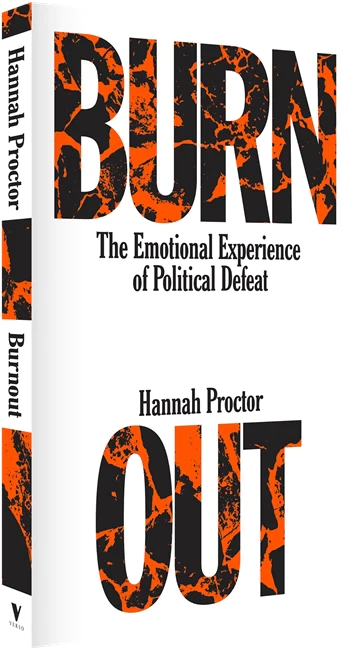I don’t remember how I came across Hannah Proctor’s Burnout: The Emotional Experience of Political Defeat, but I remember that it took me the better part of a year to read it. This was largely a problem of format, since my copy was an ebook gifted to me by a friend. If an ebook isn’t a library loan or a book club read, then it is doomed to take forever because I’ll treat it as a backup book to pull out in desperate times rather than an active project with a looming deadline.
Burnout was published in early 2024, so Proctor is addressing very recent political events; she began writing it during the COVID lockdowns in response to the electoral defeats of Bernie Sanders and Jeremy Corbyn. The book obviously went to press before Trump’s re-election, however, and I wonder how different the book would (or wouldn’t) be if she had started writing in 2024 rather than 2020.
To quote directly from the back-of-the-book summary from publisher Verso:
In the struggle for a better world, setbacks are inevitable. Defeat can feel overwhelming at times, but it has to be endured. How then do the people on the front line keep going? To answer that question, Hannah Proctor draws on historical resources to find out how revolutionaries and activists of the past kept a grip on hope.
…
Jettisoning self-help narratives and individualizing therapy talk, Proctor offers a different way forward – neither denial nor despair. Her cogent exploration of the ways militants have made sense of their own burnout demonstrates that it is possible to mourn and organise at once, and to do both without compromise.
Perhaps it’s my own inattentive, piecemeal reading that’s to blame here, but having finished the book I’m not sure I can articulate “how revolutionaries and activists of the past kept a grip on hope.” Nor can I really describe the different way forward that Proctor is offering, beyond “quashing the individual for the sake of the movement doesn’t work.” Maybe my brain is simply too melted from easily digestible pop science and self-help books with punchy, pithy bulleted lists to grasp the more complicated or ambiguous solutions she raises.
Even if my brain is fully melted, the historical scope of Burnout still made it a rewarding read for me. Proctor covers a broad swathe of leftist organizing history through eight discrete concepts: melancholia, nostalgia, depression, burnout, exhaustion, bitterness, trauma, and mourning. Each concept is illustrated by specific historical movements or moments, such as exiled Communards as a framework for looking at nostalgia. Reading it felt like catching up on years and years of history that I should have already known about. Now that I have the history in place, I can give it a more careful re-read and come away with a better understanding of the lessons Proctor believes we can learn.

